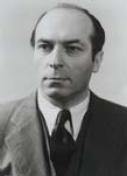Eduard Outrata
Eduard Outrata (born March 7, 1898 in Čáslav , Austria-Hungary , † June 8, 1958 in Prague ) was a Czechoslovak economist, finance minister and politician.
Life and activity
After attending school, Outrata studied law and economics at the University of Prague .
In the 1920s he started working for the Zbrojovka works in Brno , the largest arms company in Czechoslovakia. In 1933 he became sales director of the same, before he headed this company as general director and main shareholder from 1936 to 1939.
In June 1939 Outrata emigrated to Western Europe as a result of the German occupation and annexation of the so-called remaining Czech Republic, simply not returning from a trip to London . In November 1939 he participated in the founding of the member of the Czechoslovak National Committee .
In the Czechoslovak government in exile , Outrata served as Minister of Finance from 1940 to 1941 and then Minister of State for Industry and Trade. In addition, Outrata made its know-how as an arms manufacturer available to the Allies.
After the war, Outrata returned to Czechoslovakia. There he took over the position of general secretary of the economic council of the head of government, which he held until 1949 - even after the communists came to power in 1948. In addition, he acted from 1946 to 1949 as deputy chairman of the central state planning commission . He then served as deputy chairman of the State Planning Office from 1949 to 1951.
In the early 1950s, Outrata was arrested as part of the political cleansing of the period. In a ruling of November 5, 1954, the Supreme Court of Czechoslovakia sentenced him to twelve years imprisonment for high treason and sabotage. For health reasons, however, he was released in 1956 after the President of the Republic had granted him a remission on March 29, 1956. Outrata's request to retrial had already been filed in January 1956 was not processed until five months after his death in November 1958 by the Supreme Court: The Supreme Court refused to retrial because no new facts or evidence had become known. A re-examination in 1963, however, came to the conclusion that the allegations against him had been arbitrarily fabricated and that a confession had been illegally extorted from him. The accusation of treason was rejected as irrelevant because it was based on the fiction of a conspiracy, while the accusation of sabotage was considered to have been refuted by an expert opinion. On the recommendation of the party’s internal commission for the review of the Political Processes , he was rehabilitated in 1963 and the judgment of November 5, 1954 overturned as illegal.
literature
- Jiří Pelikán (Ed.): Perverted Justice. Report of the Commission of the Central Committee of the CPC on the political murders and crimes in Czechoslovakia 1949–1963. Europa Verlag, Vienna et al. 1963.
| personal data | |
|---|---|
| SURNAME | Outrata, Edward |
| BRIEF DESCRIPTION | Czechoslovak economist, finance minister and politician |
| DATE OF BIRTH | March 7, 1898 |
| PLACE OF BIRTH | Čáslav , Austria-Hungary |
| DATE OF DEATH | June 8, 1958 |
| Place of death | Prague |
